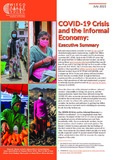| dc.contributor.author | WIEGO | |
| dc.date.accessioned | 2021-07-29T12:09:30Z | |
| dc.date.available | 2021-07-29T12:09:30Z | |
| dc.date.issued | 2021-07 | |
| dc.identifier.citation | WIEGO (2021) COVID-19 Crisis and the Informal Economy: Executive Summary, Manchester: WIEGO | en |
| dc.identifier.uri | https://opendocs.ids.ac.uk/opendocs/handle/20.500.12413/16766 | |
| dc.description.abstract | Informal employment accounts for over 60 per cent of all global employment, representing roughly two billion workers, and 90 per cent of employment in developing countries (ILO 2018). Early in the COVID-19 crisis, the ILO projected that 1.6 billion informal workers would be among those most severely affected and that they would lose 60 per cent of earnings during the first months of the pandemic (ILO 2020). The ILO forecasted that this would lead to a sharp growth in relative poverty levels among informal workers from 26 to 59 per cent globally, and a staggering 18 to 74 per cent among informal workers in low-income countries (Ibid). In regions that have experienced the worst effects of the pandemic and which have a high prevalence of informal employment, progress in reducing income poverty could be set back by 30 years (Sumner et al 2020). | en |
| dc.description.sponsorship | IDRC | CRDI | en |
| dc.language.iso | en_US | en |
| dc.publisher | Women in Informal Employment: Globalizing and Organizing (WIEGO) | en |
| dc.rights.uri | https://www.wiego.org/using-and-citing-material-wiego | en |
| dc.subject | Economic Development | en |
| dc.title | COVID-19 Crisis and the Informal Economy: Executive Summary | en |
| dc.type | Other | en |
| dc.rights.holder | WIEGO © 2021 | en |
| dc.identifier.externaluri | https://www.wiego.org/publications/covid-19-crisis-and-informal-economy-executive-summary | en |
| rioxxterms.funder | Default funder | en |
| rioxxterms.identifier.project | Default project | en |
| rioxxterms.version | VoR | en |
| rioxxterms.funder.project | 9ce4e4dc-26e9-4d78-96e9-15e4dcac0642 | en |

